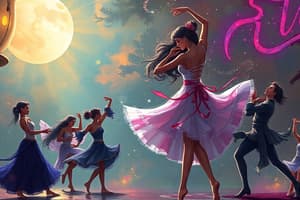Podcast
Questions and Answers
Who said that the truest expression of a people is in its dance and its music?
Who said that the truest expression of a people is in its dance and its music?
Agnes de Mille
What are the four main reasons why people dance according to Myers and Gronek?
What are the four main reasons why people dance according to Myers and Gronek?
- To please the Gods (correct)
- To please others (correct)
- To build community (correct)
- To improve fitness
Dance is only used for entertainment purposes.
Dance is only used for entertainment purposes.
False (B)
Dance is considered a significant form of __________ within primitive cultures.
Dance is considered a significant form of __________ within primitive cultures.
What did Barbara Mettler define dance as?
What did Barbara Mettler define dance as?
Which of the following is NOT a benefit of dance on physical health?
Which of the following is NOT a benefit of dance on physical health?
Dance can help decrease depressive symptoms.
Dance can help decrease depressive symptoms.
Match the following dance elements with their descriptions:
Match the following dance elements with their descriptions:
What is a characteristic of sustained dance movements?
What is a characteristic of sustained dance movements?
Dance is adapted in different times and periods of __________.
Dance is adapted in different times and periods of __________.
Flashcards are hidden until you start studying
Study Notes
Introduction to Dance
- Dance is a form of expression that can be used for recreation, entertainment, education, therapy, and religion.
- Dance is a product of intellectual effort, judged by aesthetic criteria and communicated meanings.
- Dance is different from athletics because it focuses on aesthetic and entertaining experiences.
- People dance for various reasons: to please the Gods, to please others, for self-expression, and to build community.
History of Dance
- Dance has been present in all civilizations and throughout history.
- Dance has evolved through intellectual exchange and contact between cultures.
- Dance in prehistoric times was primarily used for religious rituals, social expression, tribal unity, courtship, worship, communication, and therapeutic experiences.
Benefits of Dance
- Dance is a form of exercise and can be considered aerobic.
Physical Benefits of Dance
- Improves cardiovascular and muscular endurance, balance, coordination, flexibility, and body composition.
- Lowers the risk of cardiovascular disease, lowers BMI, lowers resting heart rate, improves lipid metabolism, and enables joint mobility.
- Improves and maintains bone density, helping prevent osteoporosis.
- Helps recover coordination and neuromuscular skills following injury.
Mental and Emotional Benefits of Dance
- Sharpens the brain.
- Decreases the incidence of dementia and Alzheimer's disease.
- Decreases depressive symptoms.
- Increases self-esteem and improves body image.
- Releases emotional and physical tension.
Social Benefits of Dance
- Provides a sense of belonging and togetherness within a group.
- Encourages positive social interaction and interpersonal relationships.
- Contributes to individual self-actualization in society.
Cultural Benefits of Dance
- Promotes culture by showcasing traditional dances.
- Bridges cultural gaps and helps people understand each other's lives.
Elements of Dance
- Dance uses elements of space, time, and energy.
Space
- The area where performers occupy and move around.
- Spatial elements include direction, size, level, and focus.
Timing
- Movements can be executed at different tempos (speeds).
- Performers move with the tempo of the sound, known as the beat or pulse.
- Rhythmic patterns are created when movement sequences or group phrases are performed.
- Silences and pauses also contribute to rhythmic patterns.
Dance Energies
- Dance is driven by energy or force.
- Force can initiate or stop an action.
- There are six qualities of dance energies: sustained, percussive, swinging, vibratory, collapsing, and suspended.
Studying That Suits You
Use AI to generate personalized quizzes and flashcards to suit your learning preferences.




